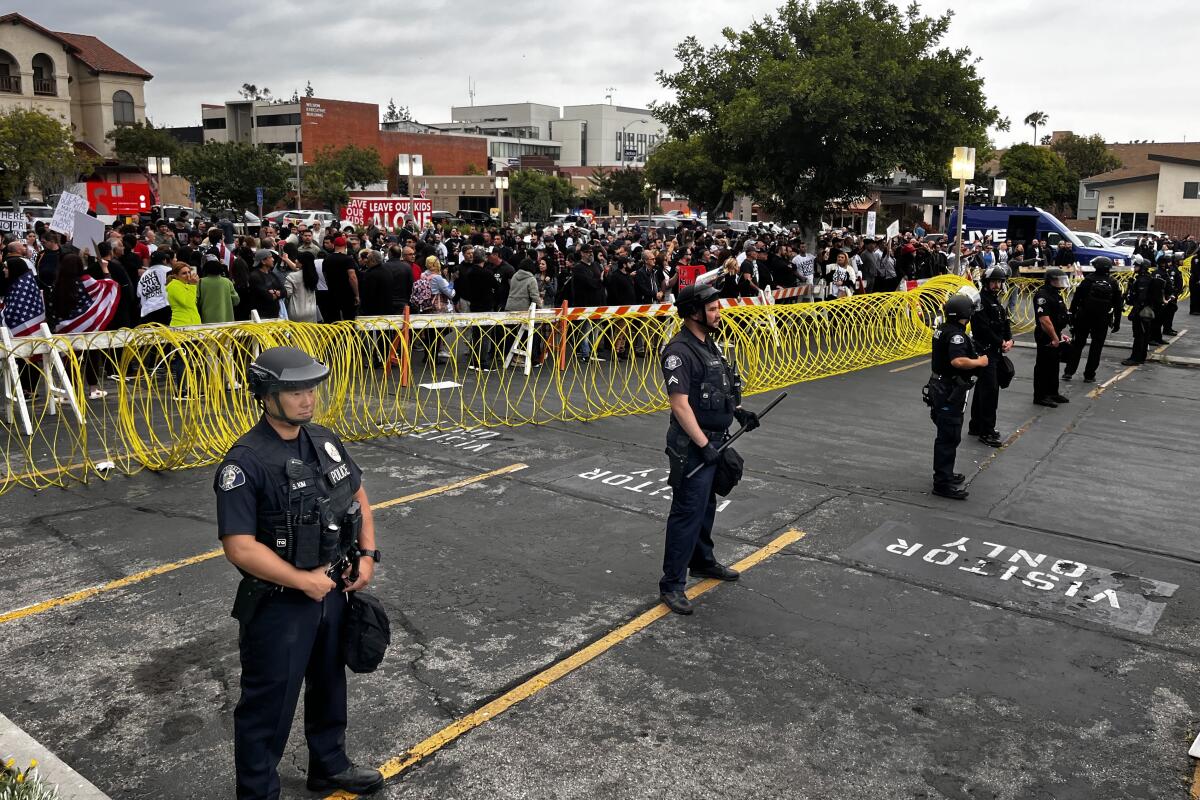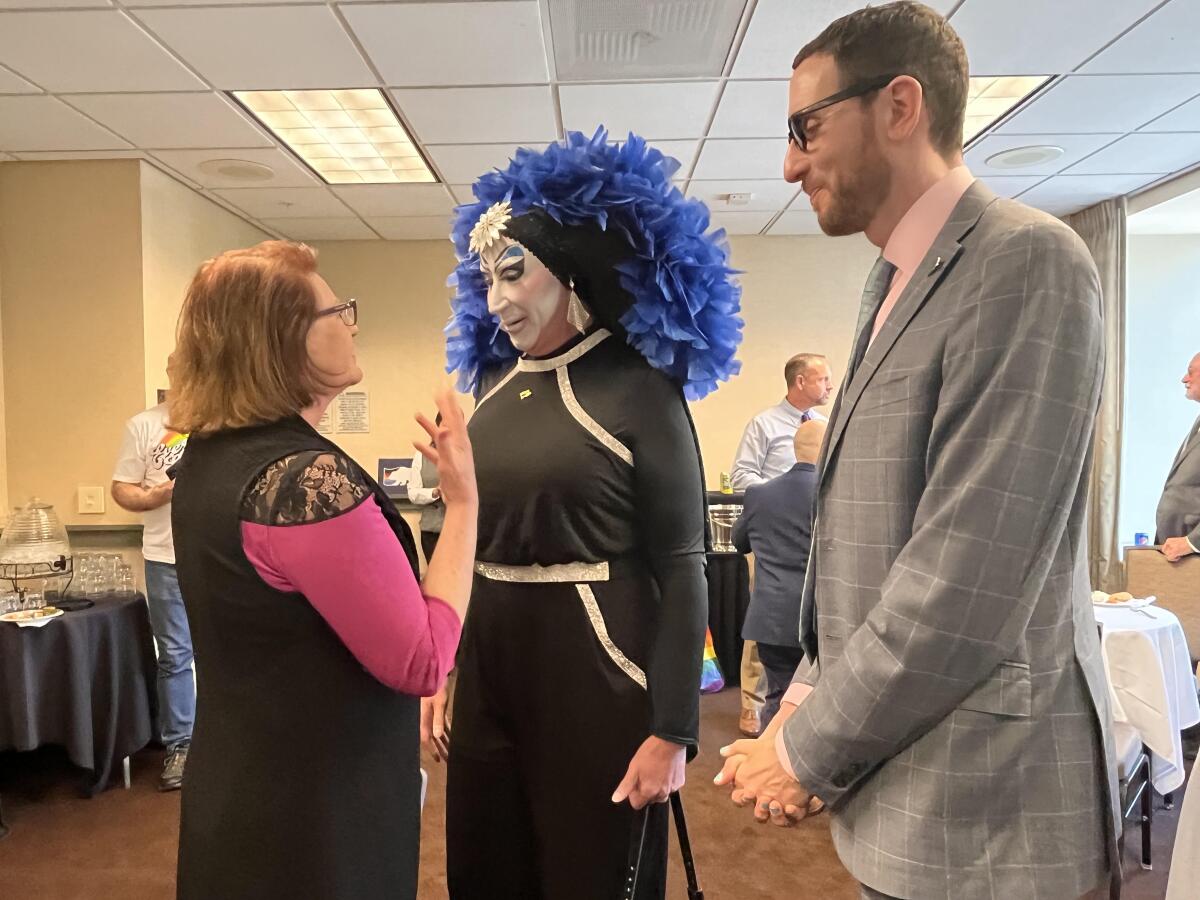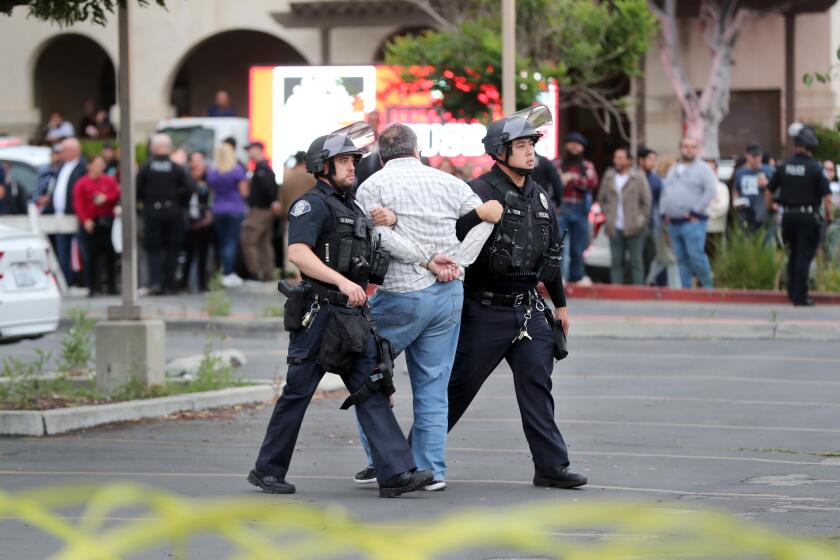How ‘Save the children’ became an excuse for anti-LGBTQ+ hate

- Share via
SACRAMENTO — Leave our kids alone. Defend families. Save the children.
Parents shouted slogans like these in Glendale, North Hollywood, Temecula and even on the steps of the state Capitol in recent days, fervid in a hate that many in California thought was a thing of the past.
But as Sister Roma, she of the much-maligned Sisters of Perpetual Indulgence, told me when we sat down for a few minutes Monday, it’s not really the parents who are fomenting the hate — and everything old is new again anyway. Leg warmers, for example, are back.
“They are clinging with white-knuckle fear to the last bit of power they have,” Roma said of the far-right agitators, just as ultra-conservatives did the last time California tried to clear its schools of anything hinting at gender diversity.
More than 75 laws outlawing a range of gender-related issues — from talking about sexuality in classrooms to holding drag performances in public — have been passed by statehouses nationwide this year. Republican standard-bearers including Ron DeSantis, Donald Trump, Ted Cruz and Marjorie Taylor Greene have made anti-LGBTQ+ hate their brand, and there is real concern that our current Supreme Court will overturn Obergefell vs. Hodges, the landmark 2015 case that legalized same-sex marriage nationwide.
Hard to believe it’s 2023, especially because California has been here, done this, circa 1978 with the Briggs Initiative, also known as Proposition 6. That’s when voters considered giving school boards the power to fire gay and lesbian teachers and anyone who openly supported gay rights.
The Briggs Initiative, named for then-state Sen. John Briggs, a conservative from Orange County, also pitted LBGTQ+ rights against parental rights. The initiative posited that allowing gay and lesbian teachers in classrooms was a danger to kids, because such educators would “recruit” students into their “lifestyles.”
“I don’t understand why we have to send our children to sit in front of a homosexual teacher for eight hours,” this newspaper reported Briggs saying in July 1977. “We can’t risk our children.”
Sound familiar?
“Save the children” is nothing new — just a recycled attack, dusted off and freshened up for another generation and supercharged through the QAnon conduit of social media to serve the purposes of a far-right intent on undermining democracy and maintaining the shaky status quo of power. Remember when we were supposed to be saving the children from the adrenochrome-drinking Democrats ritually abusing them underneath a D.C. pizza parlor?
Law enforcement declared an unlawful assembly after fighting broke out outside the Glendale Unified School District building.
If those who oppose diversity can’t outright try to ban the humans this time, they will ban the ideas, purposefully riling up supporters by conflating inclusion with indoctrination, and “grooming” with existing. Because really, who doesn’t want to save the children if the threat feels real?
Just like now, the whole Briggs mess back then emanated from Florida — specifically in Dade County where Anita Bryant, a pop singer better known for her role as the spokeswoman for the Florida Citrus Commission, in 1977 spearheaded a “Save the Children” campaign to repeal a law that protected gay and lesbian people from job and housing discrimination. She successfully argued that she had a right to control “the moral atmosphere in which my children grow up.”
Her campaign was a backlash to a decade of expanding recognition of gay civil rights after the Stonewall riots in 1969. It sparked a national movement that Briggs picked up on, with Bryant’s help.
While Bryant’s campaign was successful, it fueled a fierce response from California’s LGBTQ+ community. On the night Bryant’s ordinance passed in Florida, politician Harvey Milk, then a young member of the San Francisco Board of Supervisors, led a protest of thousands down Castro Street.
After the Briggs Initiative made it onto the California ballot, collecting hundreds of thousands of signatures, Milk was among its most vocal critics. In a memorable speech on the steps of San Francisco’s City Hall, he spoke of the need to keep California a place of hope and acceptance.
“(T)he young gay people in the Altoona, Pennsylvanias, and the Richmond, Minnesotas, who are coming out and hear Anita Bryant on television and her story. The only thing they have to look forward to is hope,” Milk said. “And you have to give them hope. Hope for a better world, hope for a better tomorrow, hope for a better place to come to if the pressures at home are too great. Hope that all will be all right.”
That’s the Harvey Milk whose legacy was recently debased by board members in the Temecula Valley Unified School District, where a conservative majority refused to adopt a new social studies curriculum because Milk was mentioned in a few pages of history materials. That is what erasure means: not allowing future generations to believe in hope for the oppressed, making them feel alone and wrong.
Wednesday, Gov. Gavin Newsom and state Atty. Gen. Rob Bonta announced that they are investigating Temecula’s action as a possible violation of state law.
The Temecula Valley School District rejected a curriculum because one book mentioned Harvey Milk, a prominent gay politician. Newsom took offense.
The Briggs Initiative was ultimately defeated by more than a million votes, despite initial polling that predicted easy passage. The tipping point was when former Gov. Ronald Reagan came out against it, along with then-Gov. Jerry Brown and then-President Carter.
Which brings me to Monday and Sister Roma at the Capitol.

I met Roma in a room full of queer leaders at a reception for Pride Month at the Capitol, where 16 LGBTQ+ activists were honored by the Senate and Assembly. Also in the room were the LGBTQ+ powerhouses of the Legislature, where more than 10% of elected officials now identify as something other than heterosexual.
It was a room you would not find in Kansas, Florida, Nebraska — or anywhere in 1978. Along with Sister Roma, resplendent in a royal blue feather headdress, those honored included tennis legends Billie Jean King and Rosemary Casals; Phil Collum, the first out assistant chief of police in Chula Vista; Janessa Goldbeck, a former Marine captain running for office in San Diego; and others you perhaps have never heard of, but who are engaged in lives of service to help make this state a better place.
The Sisters of Perpetual Indulgence have given more than $887,000 to charities since 2000, including the St. Cyprian’s Episcopal Church “Fund an Immigrant” Program, AIDS Housing Alliance / SF and the Bay Area Rainbow Symphony. That’s a bit more than the $1,500 they raised at their first fundraiser in 1980 for gay Cuban refugees. The Sisters have come a long way, but never strayed from their mission: to promulgate universal joy and expiate stigmatic guilt.
“I’ve never come from a place of hate,” said Sister Roma, whose blue eyes are kind and unflinching.
“It actually hurts” that people believe she’s ridiculing anything, she told me. But “visibility without fear encourages others,” and so she and her sisters will continue to do what they do.
Each of the honorees walked down the center aisles of the Senate and Assembly to receive gilt-framed resolutions honoring their work. Republicans walked out of the chamber both times Sister Roma received her commendation. And a few hundred protesters gathered outside, allegedly upset by the “mockery” that Sister Roma and her order represent to the Catholic Church, which, let’s remember, is facing bankruptcies across California as the financial toll of sexual abuse lawsuits mounts.
But as Senate President Pro Tem Toni Atkins (D-San Diego), the first gay woman to hold her post, told me at the reception, there has been a “sea change” in who holds power in California and there will be no going back to 1978.
“This comes down to freedom,” Atkins said. Not just protecting it, but advancing it.
Earlier in the day, on the same steps where the protest against Sister Roma took place, LGBTQ+ legislators announced they are pursuing a state constitutional amendment for the 2024 ballot that would repeal Proposition 8, the 2008 initiative that banned same-sex marriage in California. Yes, it is still in California’s Constitution despite being overturned by courts. It reads: “Only marriage between a man and a woman is valid or recognized in California.”
If the U.S. Supreme Court does overturn the federal right to same-sex marriage, having that nullified proposition on the books could be a problem in California. So as state Sen. Scott Wiener (D-San Francisco), one of the authors of the amendment, put it, “we need to be on the offensive.”
Which brings to mind another quote from Milk.
“Like every other group, we must be judged by our leaders,” he said, “and by those who are themselves gay, those who are visible.”
With activists like Sister Roma and elected officials like Atkins and Wiener in office across the state, we are on the offensive. For all the hate that is out there, churned from the basest of motives and used to exploit parents, this is not Florida and it is not 1978.
In California, visibility and equality may not be perfect. But unlike leg warmers, closets are never coming back.
More to Read
Sign up for Essential California
The most important California stories and recommendations in your inbox every morning.
You may occasionally receive promotional content from the Los Angeles Times.
















